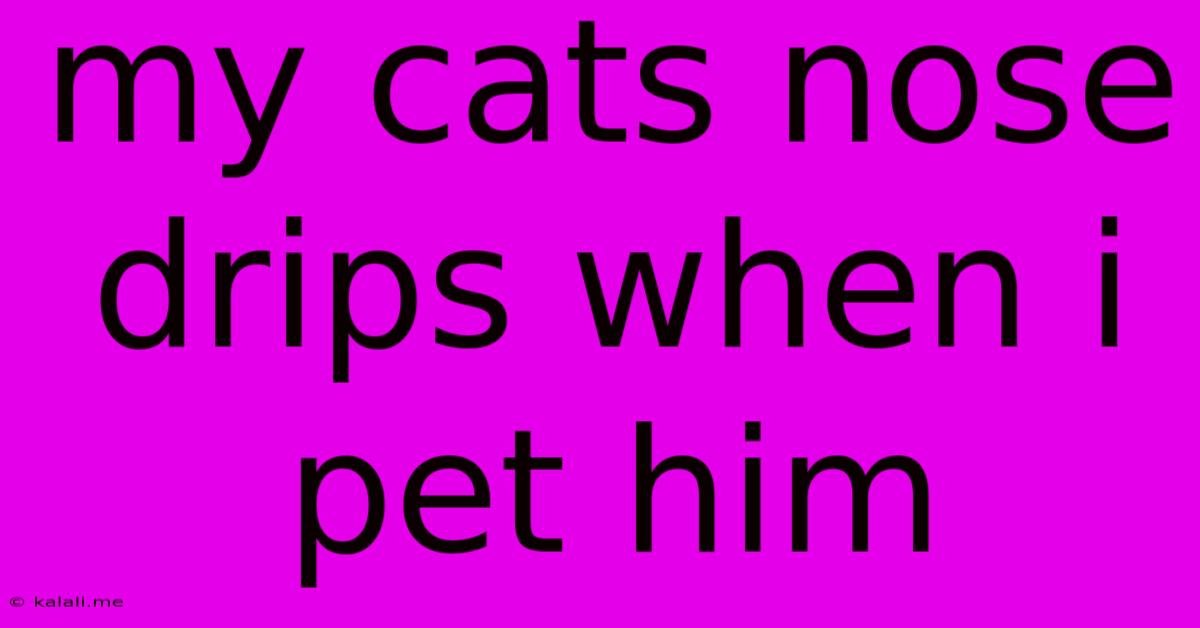My Cats Nose Drips When I Pet Him
Kalali
May 31, 2025 · 3 min read

Table of Contents
My Cat's Nose Drips When I Pet Him: Understanding the Causes
Is your feline friend's nose dripping every time you give him some affection? While it might seem a bit odd, a runny nose in cats isn't always a cause for major alarm. However, understanding the potential reasons behind this seemingly simple behavior is crucial for ensuring your cat's well-being. This article will explore several possibilities, from harmless reasons to more serious medical concerns, helping you determine the best course of action.
Possible Causes of a Dripping Nose During Petting:
Several factors can trigger a runny nose in cats, especially when they're being petted. Let's examine some of the most common:
1. Simple Excitement or Stress:
Cats, much like humans, can experience physical reactions to emotional states. Excessive petting, especially in areas they don't particularly enjoy, can lead to stress. This stress can manifest as a runny nose. Similarly, the excitement of being petted might also trigger a slight nasal discharge. This is usually a clear, watery discharge and not accompanied by other symptoms.
- Solution: Pay close attention to your cat's body language. If they seem tense, stop petting immediately. Learn to recognize their cues—a flicked tail, flattened ears, or a tense body—indicating discomfort. Try shorter, gentler petting sessions in areas they enjoy. Consider using a catnip toy or other interactive games to channel their excitement.
2. Allergies:
Just like humans, cats can suffer from allergies. These allergies can be triggered by various environmental factors, including dust, pollen, certain cleaning products, or even certain fabrics on your clothing. The resulting irritation can lead to a runny nose, sneezing, and possibly even eye watering.
- Solution: If you suspect allergies, try to identify potential triggers. Regular cleaning of your home, using hypoallergenic cleaning products, and minimizing exposure to potential allergens can help alleviate the symptoms. Consulting a veterinarian is always recommended for a proper diagnosis and treatment plan. They might suggest antihistamines or other allergy medications.
3. Upper Respiratory Infections (URIs):
Upper respiratory infections are common in cats and can present with various symptoms, including sneezing, coughing, nasal discharge, and eye discharge. The discharge might be clear, watery, or even thicker and greenish or yellowish, depending on the severity and stage of the infection. If your cat also displays lethargy, decreased appetite, or fever, a URI is a more serious possibility.
- Solution: A veterinarian's visit is essential if you suspect a URI. They can provide a proper diagnosis and recommend appropriate treatment, which may include antibiotics or other medication. Early intervention is crucial to prevent complications.
4. Dental Issues:
Believe it or not, dental problems can sometimes contribute to a runny nose. Infection or inflammation in the teeth or gums can spread, affecting the nasal passages and causing discharge. Bad breath is another symptom to watch for.
- Solution: Regular dental checkups with your veterinarian are essential for your cat's overall health. They can identify and treat any dental problems before they escalate.
5. Foreign Body:
Sometimes, a foreign object can become lodged in the nasal passage, causing irritation and discharge. This is more likely if your cat is particularly playful or curious.
- Solution: If you suspect a foreign body, a veterinarian’s examination is necessary for safe removal. Do not attempt to remove it yourself as you could potentially cause further harm.
When to See a Veterinarian:
While a slightly runny nose during petting might not always be a cause for immediate concern, it's crucial to monitor your cat's condition. Seek veterinary attention if you notice:
- Changes in the color or consistency of the nasal discharge. (Thick, green, or yellow discharge is usually a sign of infection).
- Other symptoms, such as sneezing, coughing, lethargy, decreased appetite, fever, or difficulty breathing.
- The runny nose persists for more than a few days.
Regular veterinary checkups are essential for maintaining your cat's health and catching potential problems early. They can help you understand your cat's unique needs and address any concerns you may have. Remember, proactive care is the best way to ensure your furry friend remains happy and healthy.
Latest Posts
Latest Posts
-
How To Get Cat Urine Odor Out Of Hardwood Floors
Jun 02, 2025
-
Put Mixed Burger Back In Fridge
Jun 02, 2025
-
How To Solve Inequalities With Absolute Values On Both Sides
Jun 02, 2025
-
How To Move Door Strike Plate
Jun 02, 2025
-
How To Get Playdough Out Of A Rug
Jun 02, 2025
Related Post
Thank you for visiting our website which covers about My Cats Nose Drips When I Pet Him . We hope the information provided has been useful to you. Feel free to contact us if you have any questions or need further assistance. See you next time and don't miss to bookmark.